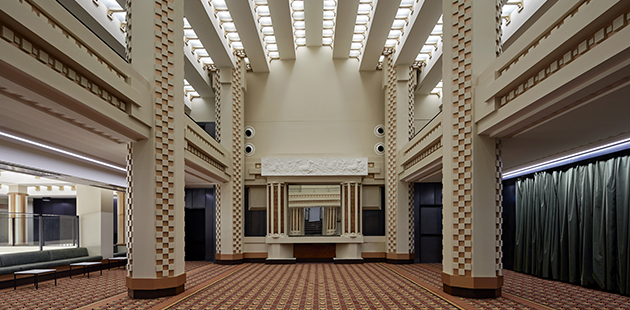 Following a multi-million-dollar refurbishment, The Capitol has reopened today as a contemporary destination for culture, education and innovation.
Following a multi-million-dollar refurbishment, The Capitol has reopened today as a contemporary destination for culture, education and innovation.
No longer the Capitol Theatre, The Capitol will retain its cinematic heritage and take a leap beyond, with the revitalised 580-seat space expected to host more than 500 cultural events, festivals and live performances each year.
RMIT Vice-Chancellor and President Martin Bean CBE said The Capitol would provide new work opportunities for students and give them the unparalleled experience of collaborating with real industry partners and the professional creative community without having to leave campus.
“Our students will have access to cutting-edge learning and teaching facilities, exposure to research and innovation opportunities, as well as work integrated learning with key cultural organisations, festivals and events,” said Martin. “The Capitol will be a home to research, ideas, innovation and new technology, where the future of Melbourne’s creative community will work alongside experienced industry practitioners to get ready for the jobs of today and tomorrow.
“At the same time, The Capitol will open to the people of Melbourne once again, to be a place of education by day and culture by night, hosting film premieres, student showcases and community events – a venue for festivals, celebration, practical education and a place to connect.”
Minister for Training and Skills and Minister for Higher Education, The Hon. Gayle Tierney MP officially opened the majestic National Trust-registered building, delivering a valuable cultural asset back to the city of Melbourne and the people of Victoria.
“This revitalisation project has transformed The Capitol at RMIT into a major cultural and educational hub, while delivering a valuable cultural asset back to the city of Melbourne,” said Minister Tierney. “RMIT students will have access to high quality training in a unique environment so they can develop skills in real-world professional settings.”
The refurbishment has seen the Capitol transformed in to a research, innovation and mentoring hub that successfully celebrates the Theatre’s storied past while looking to the future of the creative industries.
By expanding the theatre’s use beyond film screenings, RMIT has successfully created a ‘new media’ hub in an ‘old media’ setting, fitted out with the latest technology and linked directly to RMIT’s media precinct. This connectivity will enable the delivery of innovative and connected learning experiences for RMIT students across digital media, virtual reality (VR), augmented reality (AR), film and animation.
Alongside learning and teaching activities for the RMIT community, the University will develop a suite of programming for the public and, under RMIT’s previously-announced partnership with the Australian Centre for Moving Image (ACMI), The Capitol will host a range of ACMI festivals and events until mid-2020.
The iconic and architecturally-significant Melbourne landmark was originally designed by renowned architects Walter Burley Griffin and Marion Mahoney Griffin and has been under the stewardship of RMIT since 1999.
The theatre opened in 1924 and was instantly considered a design triumph. Designed to evoke a crystalline cave, the spectacular geometric ceiling concealed over 4,000 coloured lamps within a complex three-dimensional structure.
By 2014 Melbourne’s grand picture palace required such substantial restoration that the theatre was shut down, and in 2017 the University launched an appeal to support its vision for the revitalisation project.
The Victorian Government contributed $2.5 million to the refurbishment, which was completed by Six Degrees Architects and Hutchinson Builders. Private donations included $500,000 from Melbourne filmmaker and RMIT alumnus Ling Ang.
One of the first public events at The Capitol will be Viva Varda – a retrospective season celebrating the cinematic brilliance of renowned auteur Agnès Varda. The season in presented by ACMI in association with Sydney Film Festival and National Film and Sound Archive and will screen at The Capitol from 21 – 30 June 2019. For more information, visit: www.rmit.edu.au for details.
Image: The Capitol (Salon) – photo by Tatjana Plitt
